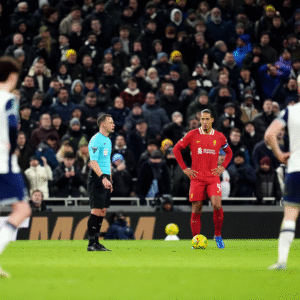16-year-old Sofia Vorobei asks if the use of AI will destroy what makes football so special

Players and referee wait for the VAR decision during a match between Spurs and Liverpool, 8 January 2025.
Picture by: PA Images | Alamy
Article link copied.
Anyone who watches football regularly has sworn at least once at AI technology after it flagged their team’s player offside by just a toe. It feels unfair – not because it’s wrong, but because it’s too right. The tiniest margin suddenly becomes a game-changing decision. That’s where the conversation about AI (artificial intelligence) in football really begins.
Harbingers’ Weekly Brief
VAR and SAOT
Ever since video assistant referee (VAR) became common, the technology used in football has kept evolving. VAR has been a huge success as it corrects the obvious mistakes referees make, leading to a fairer game. No more weird penalties appearing out of nowhere: you really notice this when rewatching older, pre-VAR matches, where soft contact somehow meant a penalty kick, and obvious fouls were sometimes just waved on.
More innovations followed, starting with semi-automated offside technology (SAOT). Now, I’m not saying it’s bad, but it is awfully precise. Offsides are notoriously hard to spot for an on-field referee (VAR is better), so it makes absolute sense that they’re now supervised by a combination of tracking cameras and player/ball data – which is exactly what SAOT does.
Nonetheless, too much of anything is good for nothing. I agree with Arsene Wenger, FIFA’s chief of global football development and ex-Arsenal manager: we need “daylight” between the attacker and defender for an offside call to be made.
Let me explain: the current rule states that a player is offside if any part of their body, excluding the arms, is closer to the opposing team’s goal line than both the ball and the second-to-last defender the moment the ball is played.
Wenger suggests a different approach — one that gives attackers a bigger advantage: a player would only be offside if their entire body was beyond the second-to-last defender. That means if any part of the attacker’s body is level with the second-to-last defender, they’d be considered onside.
Before VAR, linesmen often gave attackers the benefit of the doubt with marginal offside calls. But with VAR (and now SAOT), decisions are made with millimeter accuracy. This has led to many goals being disallowed for very slight offsides – which many argue goes against the spirit of the game and reduces goal-scoring opportunities.
TacticAI: a step too far?
Some major clubs, such as Liverpool in the Premier League, are reportedly using AI for football tactics at corner kicks.
TacticAI is a system designed specifically to suggest tactics for corner kicks. Analysing more than 7,000 corners taken in the Premier League since 2020, it’s built to accurately advise on player positioning and even predict which teammate is most likely to get the ball.
While this isn’t full-on coaching but more of an assist, it is a double-edged sword. Sure, it helps avoid mistakes and can supposedly boost scoring chances, but it also risks making the game feel stiff, and could have some worrying consequences if it keeps expanding.
If the use of AI in coaching techniques becomes standard, football might lose much of its unpredictability and uniqueness.
Think about it: coaches like Pep Guardiola (Man City) or Arrigo Sacchi (ex-AC Milan) didn’t just win because of data and a calculative mindset – they succeeded thanks to their vision, experience and tactical intuition. If AI starts making decisions on formations, set pieces and tactical changes, the individuality that defines a team could disappear.
The use of AI implies access to detailed player data, from biometrics stats to every pass or sprint in training and matches. Without even being fully widespread, the technology has already raised concerns around privacy and fairness.
In the UK, more than 400 professional footballers have initiated Project Red Card to speak out against exploiting player data without consent and demanding compensation and control over the use of their personal statistics.
Tracking tools record players’ movements 25 times per second and share the data across multiple third-party services – often without players being aware. They say that data-processing, gaming and betting companies should compensate footballers for the unauthorised use of their performance data.
On the bias front, studies show AI systems often use historical stereotypes if training data isn’t diverse, which often leads to skewed evaluations based on race, club origin, playing style or even name. For instance, scouting algorithms might undervalue players from smaller clubs or non-traditional football nations simply because these profiles are underrepresented in the data.
AI isn’t the enemy, it’s a tool – and like any tool, it all comes down to how you use it. The true danger is overreliance: if every team starts optimising the same way, we don’t only lose creativity, we get 20 versions of Madrid, Man City or whatever club is top of the algorithm this week. And that would get painfully boring pretty quick.
At some point, it stops being a competition and starts being a copy-paste with a slight difference in execution. That’s not the future of football, that’s the death of it dressed up in stats.
Written by:

Culture Section Editor 2025
Vergel, Spain
Born in 2009 in Kyiv, Sofia moved to a town in Spain close to Valencia in 2020. With her ability to quickly learn languages, she adjusted to her new life seamlessly.
Sofia is an aspiring sports broadcast journalist. She’s passionate about a wide range of subjects including culture, cinema and global affairs.
She joined Harbingers’ Magazine in the summer of 2023, and since then, she began to consistently explore the intersections of culture, creativity, and society. This, along with Sofia’s exceptional writing skills, led to her promotion as the Culture Section Editor at Harbingers’ Magazine in March 2025. Simultaneously, she serves as the Afghanistan Newsroom Editor.
In her free time, Sofia stays busy doing fitness, traveling to new places, and writing short stories.
Sofia speaks Ukrainian, Spanish, English, and Russian.
Edited by:

🌍 Join the World's Youngest Newsroom—Create a Free Account
Sign up to save your favourite articles, get personalised recommendations, and stay informed about stories that Gen Z worldwide actually care about. Plus, subscribe to our newsletter for the latest stories delivered straight to your inbox. 📲
© 2025 The Oxford School for the Future of Journalism


